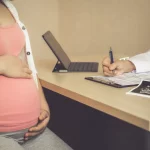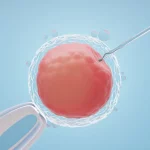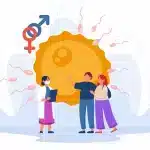
An egg donation is the process wherein a woman donates her eggs to a woman with the aim of conceiving. Such kindness can bring the wonder of parenthood to infertile families. If you agree to share your eggs, you would be interested in knowing the process and requirements involved in an egg donation. Thus, below on this blog, I will outline some of the most common questions about becoming an egg donor.
What is an Egg Donor?
An egg donor is a female who gives her eggs to someone else or a couple that cannot have children because of the failure of their infertility issue. The donors are normally young women with healthy and defect-free reproductive organs giving a chance to people to become parents.
Importance of Egg Donation
The process of donating eggs forms a very significant part of giving babies to a woman who is not able to conceive on her own due to some other reason. It might be because of certain medical conditions, age, or problems with ovarian dysfunction. Actually, it makes a great difference in the family life of someone.
- Empower women to experience parenthood: With egg donation, women will be able to deliver a child. In this regard, the women who are infertile will be able to conceive through donor eggs
- High success rates: A large percentage of successful pregnancies and healthy deliveries Carries
- Helps with family-building options: Since donor eggs act as an alternative remedy, primarily for same-sex couples and individuals
- Saves time for recipients: The receiver will find egg donation as a quick solution to having a child.
- The generosity of giving: Egg donors give life’s greatest gift to those in need
Egg Donation FAQs:
Q: What Are The Requirements For Egg Donation?
Ans: There are several important requirements to become an egg donor. These ensure that the donor is healthy and able to help the recipient conceive.
- Age: Donors usually fall into an age range of 19 to 30 years.
- Health: The donors should be fit physiologically and also psychologically.
- No genetic disorders: They should not have any known genetic disorders or chronic diseases that may affect the eggs and health of a child.
- Not a smoker: Smoking leads to impairment of the quality of eggs. It is generally a blacklisting factor.
- Body Mass Index: The ideal BMI is 18-30 since it supports healthy growth of eggs.
- Readiness to undergo any medical investigation and treatment: Donors have the willingness to undergo physical exam procedures, hormone treatment, and procedures applied for egg retrieval.
Q: How old do you have to be to donate eggs?
Ans: To be eligible to be an egg donor, you should be between the ages of 19 and 30 years. With a lower minimum age, the number of carrying nonviable eggs is reduced by the donors. Most clinics have stringent requirements for becoming a donor since it increases the chances of a donor’s success rate for egg retrieval and the recipient getting pregnant.
Q: How are donors and recipients matched?
Ans: The sperm and egg donors are matched according to the criteria. The criteria include general characteristics such as height, weight, color of eyes, and color of hair. Apart from that, genetic profiling is conducted in order to check suitability and ensure that no transmission of disorder takes place.
Q: Is Egg Donation Safe?
Ans: Egg donation is relatively safe. It involves controlled stimulation of the ovaries and a minor surgical procedure to retrieve the eggs. Like anything medical, there is some inherent risk, and it is because of this fact that proper screening and monitoring are performed.
Q: What is the difference between egg donation and surrogacy?
Ans: Egg donation is the contribution of eggs, which are to be fertilized and then implanted in the recipient’s uterus. Surrogacy refers to carrying another person’s pregnancy.
Q: Does Egg Donation Cause Early Menopause?
Ans: No, egg donation does not cause early menopause. The process of egg donation temporarily stimulates the ovaries to produce multiple eggs, but it does not affect the long-term functioning of the ovaries.
Q: Will I have coverage for medical emergencies?
Ans: Most fertility clinics cover all types of medical emergencies that may occur due to the egg donation process. Consider the following:
- Emergency medical coverage: That way, you will be covered in case something goes wrong with the procedure.
- Free Medical checkups: In other words, one gets check-ups both prior to and after undertaking the procedure.
- Support counseling after the procedure: They can follow up with you and offer support when using eggs.
- Pre-donation medical check-up: The tests involved are very keen to ensure that one is healthy for the procedure.
- Access to healthcare professionals at all hours: Most centers allow one entry to healthcare specialists throughout your donation process.
Q: Will I receive compensation for donating my eggs?
Ans: Yes, the egg donor compensation is offered to those who qualify. Compensation varies but commonly includes reimbursement for time, medical procedures, and investment of physical and emotional energy in the donation process. It depends, however, on the clinic.
Q: How long does the egg donation process take?
Ans: The egg donation process may take about 1 to 2 months of time. This would involve initial screenings, hormone therapy, and the procedure for retrieving eggs. One must ensure a proper preparation and recovery period in order to ensure a successful donation.
Q: Are there any expenses associated with egg donation?
Ans: In most cases, the fertility clinic will pay for all costs associated with egg donation. Donors are also compensated for their time and effort. A donor should not have any out-of-pocket expenses unless necessary.
Q: What are the risks of egg donation?
Ans: Egg donation is a relatively safe process; however there are some risks associated with it. Some of these are:
- Ovarian hyperstimulation syndrome: A reaction to fertility drugs that leads to the enlargement of the ovaries.
- Infection: The risk for any type of surgery is slight; you might face a bit of bleeding during the egg retrieval procedure.
- Hormonal imbalance: You will be experiencing hormonal changes which are usually temporary.
- Emotional effects: Some egg donors undergo emotional changes following egg donation.
Q: Where can I donate my eggs?
Ans: You may donate your eggs at reliable fertility clinics. EggDonors4All is a supportive agency serving egg donors in the USA. They guide you, compensate you, and arrange for hassle-free donation so that you can become an egg donor.
Q: Is egg donation painful?
Ans: Egg donation is a minimal surgical procedure to extract the eggs. Most donors experience some degree of discomfort, but it is under sedation, so the pain is minimal. After the procedure, in most cases, mild cramping and bloating could be experienced.
Q: Does Egg Donation Cause Infertility?
Ans: No, egg donation doesn’t cause any infertility. It is just the collection of eggs and nothing can stop your future chances of getting pregnant.
Q: Can I donate eggs if I have already had a baby?
Ans: Yes, as long as you have borne children because many women who have conceived children here have gone on to donate their eggs. In fact, having children is a good thing because it shows that the donor has successfully conceived before.
Q: Can I Donate My Eggs More Than Once?
Ans: Yes, a female can donate her eggs multiple times, but fertility clinics normally will have a limit on how many times a woman can contribute her eggs. This is to ensure safety and wellness not only for the donor but also for the recipient.
Q: As an Egg Donor, Will My Identity Remain Anonymous?
Ans: On EggDonors4All, the anonymity of donors is preserved in most cases unless some donor wants otherwise. The clients maintain privacy and an alternative option is given so that they can decide whether they want the recipient to know about them or not.
Ready to Be an Egg Donor?
Ready to take the next step and help make another’s family a reality? Consider being an egg donor with EggDonors4All. We’re one of the largest agencies in the country and are able to provide guidance and support to our donors at each step of the process. Our knowledgeable staff will keep you informed and at ease throughout the process. For more information or to apply to be an egg donor, visit EggDonors4All or contact us directly at 212-661-7177.

Dr. Veera Saghar
As an Egg Donor Coordinator, she plays a critical role in our company. Her background as a medical graduate from ISRA UNIVERSITY in Pakistan provides us with a solid foundation in the medical sciences. She has seven years of clinical experience practicing in the USA. This has given her firsthand experience when collaborating with patients and their families.
She is responsible for managing the process of egg donation from start to finish. We identify and screen potential egg donors.







